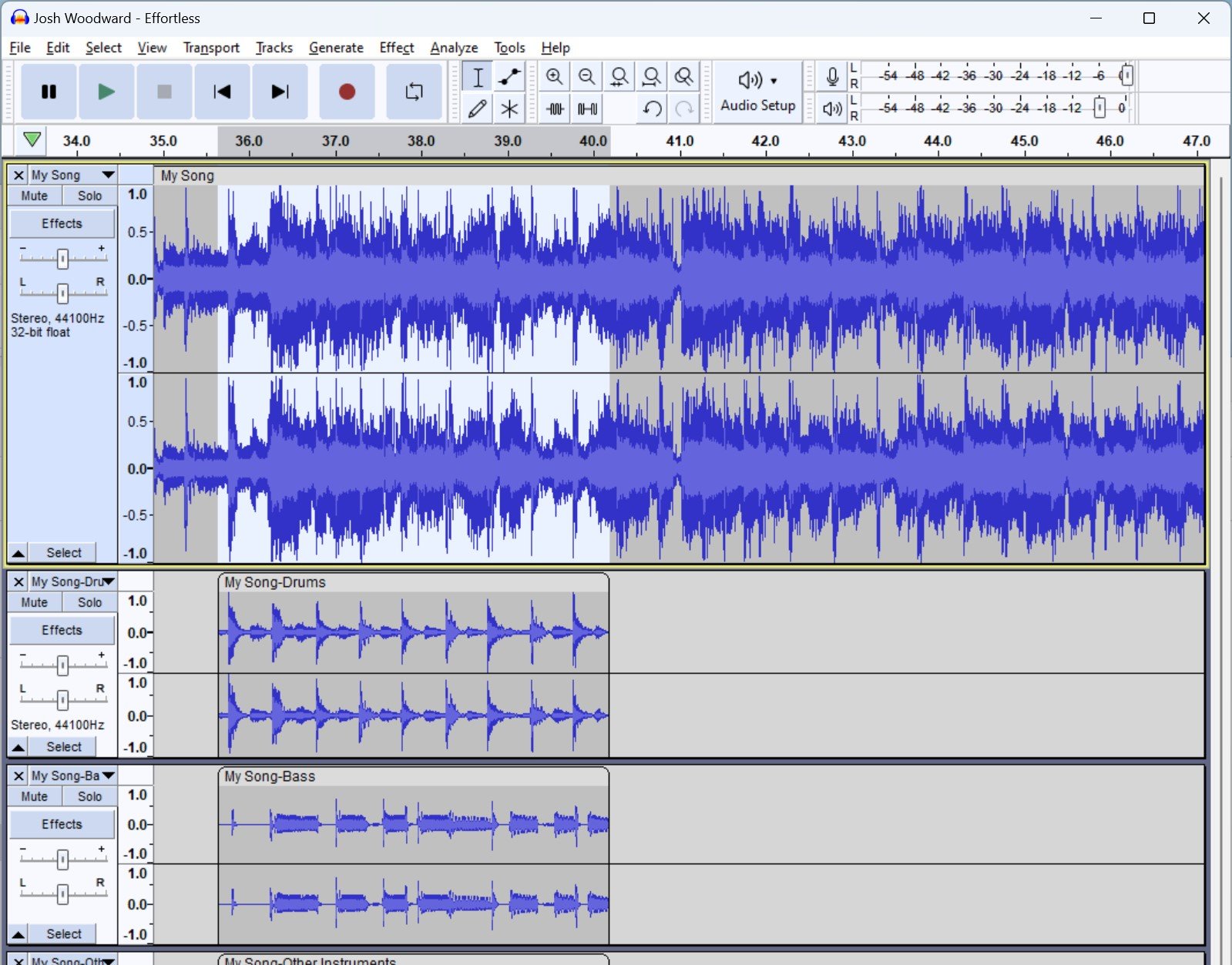[Edit: indeed, its actually good that it’s 2gb]
2gb plugin??!
Btw, does it work with tenacity?
AI models are often multiple gigabytes, tbh it’s a good sign that it’s not “AI” marketing bullshit (less of a risk with open source projects anyway). I’m pretty wary of “AI” audio software that’s only a few megabytes.
Tensorflowlite models are tiny, but they’re potentially as much an audio revolution as synthetizer were in the 70s. It’s hard to tell if that’s what we’re looking at here.
Why are they that big? Is it more than code? How could you get to gigabytes of code?
Currently, AI means Artificial Neural Network (ANN). That’s only one specific approach. What ANN boils down to is one huge system of equations.
The file stores the parameters of these equations. It’s what’s called a matrix in math. A parameter is simply a number by which something is multiplied. Colloquially, such a file of parameters is called an AI model.
2 GB is probably an AI model with 1 billion parameters with 16 bit precision. Precision is how many digits you have. The more digits you have, the more precise you can give a value.
When people talk about training an AI, they mean finding the right parameters, so that the equations compute the right thing. The bigger the model, the smarter it can be.
Does that answer the question? It’s probably missing a lot.
It’s basically a huge graph/flowchart.
It’s really nothing of the sort.
- Specifying weights, biases and shape definitely makes a graph.
- IMO having a lot of more preferred and more deprecated routes is quite close to a flowchart except there’s a lot more routes. The principles of how these work is quite similar.
-
There are graph neural networks (meaning NNs that work on graphs), but I don’t think that’s what is used here.
-
I do not understand what you mean by “routes”. I suspect that you have misunderstood something fundamental.
- I’m not talking about that. What’s weights, biases and shape if not a graph?
- By routes, I mean that the path of the graph doesn’t necessarily converge and that it is often more tree-like.
-
They’re composed of many big matrices, which scale quadratically in size. A 32x32 matrix is 4x the size of a 16x16 matrix.
The current wave of AI is around Large Language Models or LLMs. These are basically the result of a metric fuckton of calculation results generated from running a load of input data in, in different ways. Given these are often the result of things like text, pictures or audio that have been distilled down into numbers, you can imagine we’re talking a lot of data.
(This is massively simplified, by someone who doesn’t entirely understand it themselves)
It seems reasonable given it includes multiple AI models.
2gb is pretty normal for an AI model. I have some small LLM models on my PC and they’re about 7-10gb big. The big ones take up even more space.
Isn’t tenacity a joke project made by 4channers
That fork is sneedacity, which is very dead.
Gotcha, thank you for the info. Gotta admit their made-up words are pretty funny
Tenacity is a Audacity fork without telemetry
Isn’t the telemetry in Audacity opt-in anyway?
The fork was created when Audacity was bought and one of the first things the new developers were about to do was add opt-out telemetry. People didn’t like that at all. From what I read in this thread, they ended up adding opt-in telemetry instead.
I thought audacity was tarnished with spyware or something these days. Is it safe again?
after looking into it:
it’s not and it never was.
a) it’s open source, so nobody’s putting that shit in there without getting caught
b) it had an opt-in error reporting feature that would send data back… that was the entire thing…What? You must be joking. Really? The entire thing was about opt-in error reporting?
… seriously, that can’t be it, can it?
Not really that simple, it was an apparent change to the privacy policy that vaguely anticipated collection of arbitrary user data, which shook the confidence of the open source community on the project. The fact this happened right after audacity was sold was the cherry on top.
https://github.com/audacity/audacity/issues/1213
Changes were eventually reverted or revised.
yep… really just that…
i’ve used it forever with a very restrictive firewall and i’ve never seen it do anything unexpected… or any phoning home at all…
Point a has always me me wonder, is that accurate? Are there actually people going through the code to make sure open source isn’t malicious? I can barely read my coworkers code… Let alone a strangers.
people are definitely going through the code on a project as popular as audacity…
less well known stuff is much less scrutinized, of courseIts way less work than going through the code to check for telemetry unless it is an intentionally hidden attack- just use Wireshark and check if there is network traffic other than checking for an update on program start.
If a project is popular people will make changes to it every day. But you can look at the repo and judge for yourself.
It was a pull request to add opt-out analytics that got blown out of proportion, where the real issue was the EULA and how tonedeaf of a move it was considering the community around Audacity. IIRC, they ended up replacing it with opt-in analytics.
Not really, but there is a fork called tenacity which fixes this
I’ve been using the OpenVINO plugins for a few weeks and it’s genuinely impressive. Noise cancelling is one thing, but the transcription tool is amazing. I can create subtitles from conference recordings in minutes and create transcripts of recorded zoom calls, etc. and it does it for multiple languages.
That’s the kind of shit I like using AI for.
music generation and remixing
any insight as to what this is?
The music separation and speech transcription plug-ins actually sound nice. Obviously that will depend on how reliable they actually are.
deleted by creator
I read “Audacity ads” and thought for a moment they had gone to the dark side
We already had a scare with them, but turns out it was very unfair overreaction to the project.
In this case I’m happy as long as it’s hardware platform independent and uses open source released models.
AI music art has been for a long time in the hands of industry moguls and us peasants have had nothing. So I’m happy with anything that puts this power in the hands of the everyman.
Use Tenacity instead
Why?
Edit: I see now. https://tenacityaudio.org/docs/_content/Motivation.html
What’s the difference?
In April 2021, Muse Group acquired the famous audio editing applicaiton Audacity. Their goals for Audacity were to bring much needed improvements to Audacity. However, not too long after, there was an attempt to add telemetry to the program
Ok so what’s Tenacity? A fork pre shittification?
Aye, but a little more convoluted. TL;DR: Several new projects forked to avoid the enshitification, and with much time and drama, most of the actually active maintainers joined forces under the Tenacity name+repo. (And 4chan was part of the drama, because of course they were.)
Oof. That’s sad.
Windows only :(
According to the repo, it builds fine on Linux. They just don’t distribute a binary for it.
https://github.com/intel/openvino-plugins-ai-audacity/issues/27
It’s already on the AUR
I fucking love arch and its community
Presumably you could use it in a VM running Windows
I’m sure I used to use Audacity back in the day as a free, quick and dirty editor to splice up audio tracks. I’m talking at least 10 years ago.
Had no idea it was still even a thing.
It’s honestly pretty much the industry standard for indie creators. There’s nothing super flashy about it, it just does its job very well.
This along with 7-zip and OBS and the like have been pretty impressive success stories for FOSS, even if most of their users don’t even know what that means.
…and Audacity for Windows 64-bit is required to run these plugins.
Useless.
On lemme I’m often reminded of the vegan joke:
How do you tell if someone is a Linux user? Don’t worry, they’ll tell you.
Having no need for over 4gb of RAM?
Oh boy this is what I always wanted woooo
Awesome, useful features if they work well. I’ll have to try it out.
I wonder if it can “de-brickwall” music now
De-brickwall?
Edit: Googled it.
Wanna share with the rest of the class?
To make music louder so it stands out, producers amplify the music until the waveform looks like a straight line instead of peaks and valleys of loud and soft
Ah, the loudness wars …
Was the training data ethically sourced (for music generation)?
How do music creators feel about their work potentially being regenerated and used in other’s works?
Considering copyright is unethical to begin with…
I could almost agree but I think there is value in copyleft: a hack of copyright to ensure users have some of the rights copyright denies when you get a copy/derivative work from another.
With no copyright it’s great that you won’t be sued if you share software but in practice a mere binary isn’t enough (reverse engineering is impractical). We need the source code to be able to change it (or understand what it’s even doing). I won’t support removing all copyright law without a solution.
Define ethically sourced.
Free range grass fed.
Getting permission to copy each music work for use in training data may be ethically important while the creators are dependant on income from that work to survive, or just as a social contract.
The capitalist mindset really is a weird one, rent seeking is out of control. We’re talking about a tool that allows independent creators and hobby users to improve the quality of their projects but all you can think about is the possibility of getting a couple of dollars in royalties.
Regular users being able to use advanced noise reduction allows regular people to better compete with corporations, it’s the sort of technology which can help displace the monopolies which rule the world. But you’re against it because they didn’t give you 6 cents for listening to your cover version of country roads
Completely agree, but one thing:
help displace the monopolies
These monopolies are a social/legal problem. It can’t be solved with technology. The increased FTC action in the US under the Biden administration are really a hopeful sign.
I am worried about the number of people who want to go in the opposite direction, which “ethically sourced” is simply code for.
Consider there is nuance here. I write code and want people to use it but only if they follow the license that means they must share it with others. I liked the idea of AI creating art for me until I considered the tool’s method of creation and the negative effect taking from artists may have.
I suggest supporting independent creators directly instead.
you are saying this like the music indistry weren’t about resampling/remixing/rethinking existing songs/melodies/phrases already. it always was. and that’s fine! people always gets down to the source if they hear something fancy.
I can’t image people always get to the source, my understanding is most music does not have attribution of significant portions copied.
I can’t imagine…
well yeah, there’s a lot of things I can’t imagine either, the world is a strange place
Indeed, but without reason to change my mind it will remain the same.
How do music creators feel about their work potentially being regenerated and used in other’s works?
They can always discuss that with their psychologists! :)
Audacity just doesn’t seem worth the trouble after discovering Reaper and how powerful it is for only $60.
I’m a sound engineer and I use different DAWs for different purposes. There’s just no one DAW that does all, so this is a compromise I’m happy to go with.
When I do podcast editing, I use Audacity to split multi-track WAV files and for truncating silence. It’s just waaaay easier to do this there than on Reaper. Plus it has a loopback recording feature built-in which I use for Zoom meeting recordings etc.
I use Pro Tools for audio post, but for most of what I do I’m a Reaper guy. It’s very powerful as you said and it just works.
I know it can be a hassle switching DAWs (muscle memory on shortcuts can get weird), but for me, I like making the most of the strengths of a tool rather than forcing something to do everything.
That’s awesome!
I learned DAWs with ProTools back around 2006 in college. Dropped out because I didn’t want to enter a competitive trade where my best opportunities were moving out of state.
Got sucked into another industry and haven’t touched much audio for the past decade. Getting back into it now and started on Audacity but the 2021 buyout had me confused where to land with the Tenacity split. the good/bad of open source I suppose but as a user being in the middle of a split was frustrating and detracting from recording. Finding out about Reaper and talking to people leaving ProTools behind even within the industry was just what I needed when I needed it.
My daughter (11yo) is now getting into DAWs as her current goal is to score an internship at KEXP, being able to share with her all the stuff I learned in school has been so much fun.
I see what you mean, in your case as well as mine, Reaper is far more powerful and so far more adequate to our needs But people do not always search for powerful software. Sometimes they only want something easy to learn, with only basic tasks but well performed and entirely free. When you have these requirements, Audacity is better
Audacity is a great learning tool for intro absolutely! When you’re just dipping your toes into recording and editing, free and $60 is a huge difference.
I feel like users that are going to be using any of the features of this plug-in, they’re probably at the point that going to Reaper makes sense.
Does Reaper have similar AI tools? Not a dig, a real question.
Not at the moment, from what I know























